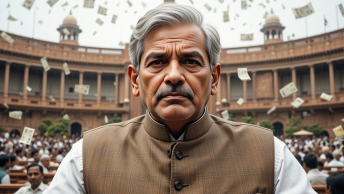Mr. Venkatesan’s post (see below) yesterday on the ongoing challenge in the SC with respect to James Laine’s book on Shivaji returns us to the broader issue of the extent of limitations on the freedom of speech in this country, a matter discussed several times before on this blog (click here, here and here for other posts upon the subject) . One question raised in the previous post was whether the author James Laine would be willing to withdraw the allegedly objectionable portions of the book. That indeed appears to be the case – the SC judgment in the first Laine case (Manzoor Sayeed Khan v. State of Maharashtra) notes that the author already submitted an affidavit to the High Court in this regard. However, the State said that ‘one passage (it does not say which one) hurt the sentiments of the people of all sections of society and that it would not be in the larger public interest to drop the charges’. Only when the State rejected this ‘compromise formula’ was the matter heard on merits.
In the current issue of EPW, Iqbal Ansari, writing on the Taslima Nasreen case, quotes some passages from her writings and argues that a good case is made out for prosecution under sec. 153A, 153B and 499 – 502 (defamation) of IPC. He basically cites two passages, one from page 48 of her book Dwikhandita:
“If somebody, being inspired by Islam, follows the commandments of Allah and wants to be a true Muslim, then he easily may take oath from the Quran wherein it has been advised not to make friendship with the Jews and the Christians, i e, non-Muslims. If somebody does not follow this, Allah will throw him into the fire of Hell. Not only this, (Quran says) wherever you get non-Muslims destroy them, kill them. Whenever you find a non-believer (who does not believe in Islam) cut his left arm and right leg with one strike and his right arm and left leg with another (Dwikhandita, p 48).”
and a second from page 50:
“…he [Prophet Mohammed] killed people without any hesitation, bathed in the blood of people of other communities, ruthlessly killed the people of other religions, ordered his soldiers to loot the wealth of the Jews and he raped their women, thus he could hoist his victory-flag…What could I say! This is the character of our Scoundrel Prophet. And there is the great fraud named Allah in his (meaning Holy Prophet) jobba (loose garments). The billions of fools all over the world are keeping this Islam still alive. This is nothing but tricks of politics (Dwikhandita, p 50).”
He says that the court “lifted the ban [on her book] on September 22, 2005 [(2005) 3 CALL T436 (HC)] on the ground that though it contained harsh language against the Prophet there was no deliberate and malicious intention of the author of Dwikhandita to outrage the religious feelings of any class of citizens of India (emphasis supplied). The book in the judges’ view did not invite forfeiture as insult to religion was not the central theme or moral of the book, read as a whole. Moreover the author was dealing with the specific religio-political situation in Bangladesh which was a theocracy and not India, which is a secular country. In their lordships’ view Taslima Nasreen was administering a shock therapy not to Muslim citizens of a secular democratic India, but to the citizens of a theocratic Bangladesh which had adopted Islam as a state religion, under whose influence women were being oppressed, whose emancipation is a major concern of Taslima Nasreen’s writings.” He criticizes this judgment as “purely ideological – political rather than rights oriented which makes the judges show overindulgence to Taslima’s language and text as being shock therapy for people in stupor in Bangladesh”. Ansari takes objection to both form and content – her use of words such as ‘ruthless murderer’, ‘rapist’ and ‘scoundrel’ in case of the former and what he considers a perversion of Islamic tenets in the latter case. Though the acceptability or otherwise of those specific words is debatable, he clearly has a point here.
In the first Laine case(Manzoor Sayeed Khan v. Maharashtra), the Court said that for the purpose of sec. 153A, ‘the matter complained of within the ambit of section 153A must be read as a whole. One cannot rely on strongly worded and isolated passages for proving the charge nor indeed can one take a sentence here and a sentence there and connect them by a meticulous process of inferential reasoning’.
I have several questions in all of this and hope other readers will pitch in.
1. In the present case, what is the point of asking for deletion of passages if a book is to be considered as a whole (this question is apart from one about the wisdom of the court proposing such ‘compromise formulas’ in the first place)? 2. If the book as a whole has a theme that may not obectionable at all, is it acceptable to insert passages in between that are outrageous in form or content? If a particular individual in a story were to be virulently inimical to a respected king, prophet or religion, would it be acceptable notwithstanding the fact that the other characters do not share his animosity and the overall theme may be quite benign? 3. How does one decide whether a book is deliberately and maliciously intended to insult somebody or a belief/doctrine? Is there a distinction between discrediting a belief/person and insulting someone? In a previous post, Mr.Venkatesan quoted Sorabjee as saying thus: “One may legitimately criticize the tenets of a particular religion and characterize them as illogical or irrational or historically inaccurate. But it is not permissible to condemn the founder of a religion or the prophets it venerates as immoral persons or frauds and charlatans. Courts would in such cases probably infer a “deliberate and malicious intention” to insult the religion, particularly if the language is abusive or vituperative.” If abusive or vituperative language alone were the criterion, it would be fairly easy to make a distinction because only form of speech is involved (and words, contrary to context, being relatively immutable per se, future writers will know exactly what not to use or use at their own peril). But if one were to go by content, how can one discredit a belief without that judgment reflecting on the one who propounded it or around whom it is centered? The veneration of religious and historical figures is often founded on faith – to the extent that it conflicts with the present-day understanding of the real world, its claims may be demonstrated to be flawed. And there can be a very thin line between a discredited peddler of faith/myths and a fraud/charlatan. As a hypothetical, would the writings and speeches of people like Robert Spencer, David Horowitz, Ayaan Hirsi Ali and others who basically potray Islamic doctrine as a dangerous and aberrant theology (if you have not read their writings, just google their names and you should come up with a bunch of articles) therefore be permissible? 4. Is factual truth a defense? For example, Robert Spencer’s inferences are based on quotations from the Quran which are all usually referenced (and I take it that they are correct in that respect). To cite another example, it is widely stated that one of the Prophet Mohammed’s wives was only six years old when married and nine when consummated. On that basis a prominent religious leader called him a ‘demon-possessed pedophile’, something one might call an adult in today’s world having sex with a child. Could an expression of moral revulsion that is currently acceptable and routinely made to ordinary individuals be permissible about a deity/prophet? Or should deities/prophets be outside the purview of any adverse moral judgment regardless of facts under an accepted standard?







1. Isnt the purpose of free speech protection to protect unpopular/offensive speech? Inoffensive speech does not need protection to begin with.
2. Even if one concedes a hate speech exception to speech, it must necessarily be confined to promoting hatred against a definable group. this is NOT the same as criticising, howsoever harshly, the beliefs of that group. section 153A(a) is directed against promoting ‘enmity’ between groups – how does Taslima Nasreen’s criticism of Islam promote enmity amongst any groups? In any case, why should religious belief have a special constitutional status in a secular society?
3. It is true that Article 19(2) has a public order exception to free speech, reflected in ‘likely to disturb the public tranquility’ clause in section 153A(b). this is a terrible exception that encourages social censorship. all that a group needs to do is to engineer public order problems (so easy to do in India) against a speech it does not like. remember dera saccha sauda, calcutta protests against tasleema and numerous other examples? this is a self-fulfiling exception that can always be achieved by a political group that does not have qualms with using violence for political purposes (that would probably include every group in India – Raj Thackery’s defense of his ‘movement’ expressly defends political violence).
4. I hope we can still see the beauty of Bachchan’s ‘Madhushala’, made popular in the distant 1930s. today, perhaps, its reception would have been different:
‘He who has burnt all scriptures with his inner fire,
Has broken temples, mosques and churches with carefree abandon,
And has cut the nooses of pandits, mullahs and priests —
Only he is welcome in my tavern.’
the SC’s proposal of deleting certain paragraphs from Laine’s book makes a mockery of Article 19.
Thanks for the comment. I agree completely with what you say. You are of course right that section 153A should not apply to Taslima Nasreen because multiple religious groups are not involved here. But that is small consolation if charges under section 295A and 499-502 can be made to stick.
As I see it, there are two problems here. One is that when we are talking of the content of speech (not form), the distinction between hate speech and legitimate criticism is not very clear. Under section 295A (which, as pointed out in VV’s previous post, has been upheld by the SC in Ramji Lal Modi v. State of UP), is there a distinction between criticism and insult of religion/religious beliefs? Again under 153A, what does ‘ground of religion’ mean – does it refer to religious doctrine, prominent figures, followers? if a comparative review of two religious doctrines concluded by deprecating one and hailing the other, would that amount to promoting enmity between groups on ground of religion? Likewise, in place of a written review, if we had a politician, say from the Hindu right, doing the same thing in a speech, is that an offense under 153A?
The other problem is that the distinction between criticisms of an individual who is central to a narrative is not easily divorced from a critique of the precepts themselves. Some commentators (such as Ayaan Hirsi Ali) say that in the case of Islam, the Prophet Mohammed is seen as the ideal person and it is the religious duty of every practicing Muslim to model his own life on that example (likewise, his wife and daughter are role models for women). They argue that it is therefore impossible to criticize religious notions without also repudiating at least some of the beliefs, values and conduct of the Prophet’s own life. I do not know if this is indeed the case but it raises an important point about whether a distinction between the precepts and the person who propounded them is meaningful at all. Secondly, if the tenets and prophets/deities are fair game for criticism, the practices of a religion that flow from those tenets and prophets/deities cannot seriously be excluded. All of that leaves only speech against the followers themselves open to proscription which raises the question whether it is workable.
Your point about why religion ought to have a special status in a secular society is a good one. Unfortunately, the fact remains that these laws continue to be in the books and the status quo is likely to continue in the foreseeable future. Many people see considerable utility in keeping it that way for maintaining public order (though, as you point out, the view is open to challenge). While there have been some calls to remove sec. 295A, to my knowledge,there have been no similar proposals about 153A.
It is freedom of expression that needs protection, however unpopular the idea may be.
The trend of asking authors to delete is unhealthy and dangerous.
Technological revolution is changing the parameters of the debate.
What does a ban mean in an inter-connected world.
If a book that is anned in
india is available in the net for free download what can the court or government do. Can they prevent the book being read in india.
ravi srinivas
Mr Dilip wrote:
“How does one decide whether a book is deliberately and maliciously intended to insult somebody or a belief/doctrine?”
My opinion:
a) unless the abuse/insult can be shown as meant to make a larger, socially relevant point;
b) and unless that point is regarded by ordinary people as advancing a reasonable cause
the said abuse must be considered as wanton abuse meant for the purpose of giving offence.
Consider two hypothetical cases. In the first, a feminist lambasts Rama of Ramayan in abusive language for his ill-treatment of Sita. In the second, an artist portrays Rama in an “offensive” light — in a urinal perhaps, or as copulating with an animal.
Numerous tracts were written harshly critiquing Rama’s conduct towards Sita, and they did not face trouble.